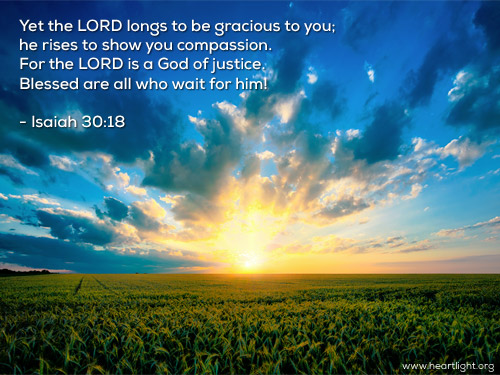"Yet the Lord longs to be gracious to you; therefore he will rise up to show you compassion. For the Lord is a God of justice. Blessed are all who wait for him!" (Isa 30:18) "Return, you Israelites, to the One you have so greatly revolted against" (Isa 31:6, NIV).
Theme: Though we stubbornly and proudly insist on relying on our own plans instead of trusting God, yet God still longs to be gracious to us. This is the amazing logic of grace.
Isaiah 30 and 31 are connected because they both begin by denouncing the alliance with Egypt in the most explicit terms (Isa 30:1-5; 31:1-3).
How does God manifest his grace? God's people rebelliously and stubbornly insisted on carrying out their own plans of relying on Egypt instead of God (Isa 30:1-5; 31:1-3). Despite refusing to trust God (Isa 30:1-17), God still longs to be gracious to his people (Isa 30:18). How? There are three images of the Lord depicted in Isa 30:19-33.
- Teacher (Isa 30:19-22).
- Healer (Isa 30:23-26).
- Warrior (Isa 30:27-33).
- The Amazing Logic of Grace: We Forsake God, Therefore He is Gracious (Isaiah 30:18). My daily bread Dec 2010. Stubborn children with their own plans. When his people are faithless, God remains faithful.
- Refusing God's rest, quietness and peace (1-17). Rather than turning to God, the people "add sin to sin" (Isa 30:1) and apathetically fail to ask for divine direction, instead seeking "shelter in the shadow of Egypt" (Isa 30:2-3). But what at first appears a safe haven ends up being a position of shame and disgrace (Isa 30:4-5). What is Egypt in comparison to the Creator? In the long run, her "help is worthless and empty" (Isa 30:7), whereas God is our ever present help in time of need (Ps 46:1; Heb 4:16).
- The amazing logic of grace (18-33). Sometimes we imagine God prefers punishment to pardon, but Isaiah reminds his listeners, "the Lord waits to be gracious to you, and therefore he exalts himself to show mercy to you" (Isa 30:18). He is exalted as he comes low, forgiving, restoring, and enlivening. Those who "wait for him" experience his merciful justice. Isaiah promises, "in the day when the Lord binds up the brokenness of his people," he will go on to heal the "wounds inflicted by his blow" (Isa 30:26). These words find their ultimate fulfillment in Christ, as we see that the blow against our sin fell on him. By his wounds we are healed (Isa 53:5; 1 Pet 2:24).
- The Difference Between God's Rule and Man's Rule (Isaiah 31,32). My daily bread Dec 2010. Ch. 31-32 is about those who go down to Egypt for help. God calls his people to stop trusting in man and return to him, promising them the Messiah and his Spirit. Ch. 31 echos a common refrain throughout Isaiah. It is the warning not to trust in political muscle more than in God's provision (Isa 31:1). Egypt again represents military and economic strength (Isa 31:1-3), yet God will win the battle as he fights on behalf of Zion (Isa 31:4-5). Trusting in Egypt represents trusting in the "idols" of silver and gold (Isa 31:7), but God's people must instead "turn to him" (Isa 31:6) who created such materials and stands over even the strongest powers (e.g., Assyria; Isa 31:8-9).
- Webb, Barry G. The Message of Isaiah, 126-134. A final solution: dependence on Egypt (30:1-31:9).
- Rebellious children (30:1-17).
- Gracious Lord (30:18).
- Grace in action (30:19-33). God as teacher (19-22), healer (23-26), warrior (27-33).
- Reasons for repentance (31:1-5).
- Repentance and its fruits (31:6-9).
- Motyer, J. Alec. Isaiah.
- (213-225) The fourth woe: Faithlessness and faithfulness (30:1-33).
- Contemporary events: Egypt no help (1-7).
- The word refused (8-17).
- The promise kept (18-26).
- Contemporary events: Assyria no threat (27-33).
- (225-233) The fifth woe: All things new (31:1-32:20).
- Disaster and deliverance (31:1-5).
- The first summons: repentance (31:6-9).
- Righteous King, new society (32:1-8).
- The second summons: hearing (32:9-14).
- Outpoured Spirit, new society (32:15-18).
- Epilogue: Blessedness beyond disaster (32:19-20).

No comments:
Post a Comment